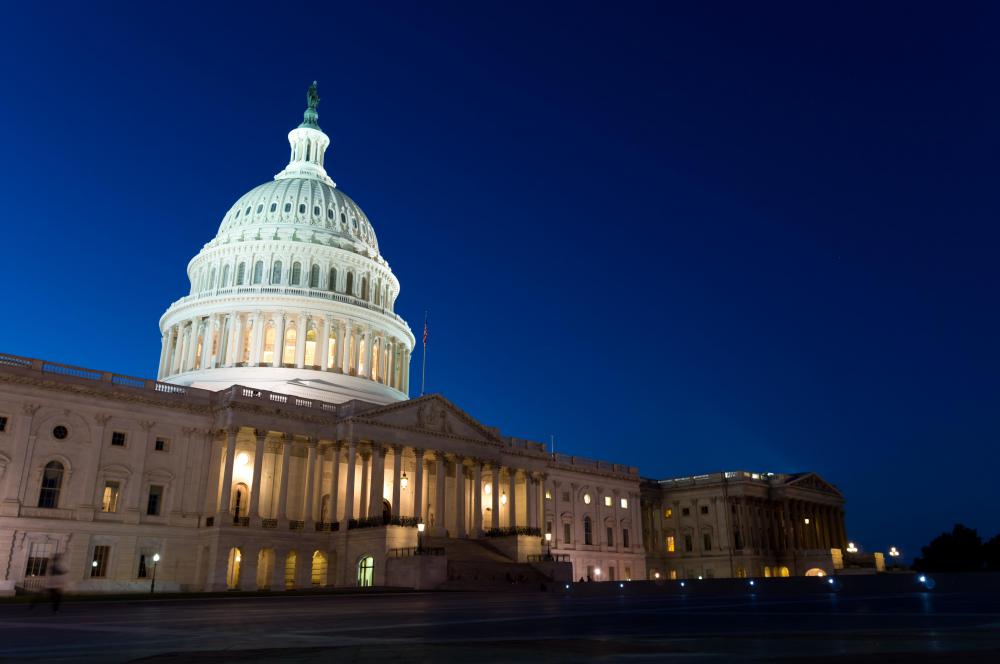At WiseGEEK, we're committed to delivering accurate, trustworthy information. Our expert-authored content is rigorously fact-checked and sourced from credible authorities. Discover how we uphold the highest standards in providing you with reliable knowledge.
What Is a Government Shutdown?
A government shutdown is a process where federal employees and institutions must suspend activity without pay for an indefinite period of time due to a lack of agreement by congressional representatives as to how to pay for these services in the federal budget. The US government offers the most prominent example of government shutdown procedures, where it has experienced five such shutdowns as of 2011, all occurring in the late-20th century. US government spending is allocated on a fiscal year basis like many corporate budgets, and the budget must be approved for the coming year by the deadline of 30 September in order to avoid a government shutdown.
Three of the government shutdown incidents that have occurred in US history were fairly minor in nature. Those that took place in 1981 and 1984 lasted less than a day each, though they effectively furloughed 400,000 to 500,000 federal workers each time. The shutdown that occurred in 1990 lasted slightly longer, as it took place over a three-day federal holiday on the Columbus Day weekend, yet most federal workers had time off for the holiday and were not directly affected by the process.

The two most severe government shutdowns in US history as of 2011 took place between 1995 and 1996. A political impasse concerning fiscal policy between a Democratically-controlled White House and a Republican-controlled Congress at the time over how to fund spending for Medicare and public services such as education and healthcare led to the shutdown. The government initially ceased operations of various departments on 14 November 1995, and this continued to escalate into April 1996. The process led to widespread suspension of many essential government services, such as delays for retirees and people with health needs applying for Social Security pay and Medicare funding, the suspension of clean-up to toxic waste sites, and the halt of services to US veterans. It is the policy of the US government, however, to maintain core services such as those of the Armed Forces and air traffic control during shutdowns, even though these employees may not be paid during the time period.
Shutdowns create an increased burden for the government budget due to the fact that furloughed employees are eventually paid for the time that they were absent, though they performed no work during this period. It can also result in lost revenue for the government, as facilities that bring in federal income such as the National Parks service are temporarily closed. A government shutdown does not necessarily involve all federal branches at once, however, and, within the US, the decision for which services are to be closed first is made by the Office of Management and Budget (OMB).
The US Congress makes its budgetary decisions for tax levels and how to manage government debt through reports made to it by the General Accounting Office (GAO) established in 1921, and recently renamed to the Government Accountability Office (GAO). As the national debt in the US rises, incidences of government shutdown are likely to increase, with one case being narrowly averted by a last-minute agreement on a budget in the US Congress in March 2011. The deadline in this case was March due to the fact that temporary spending bills had been passed since the previous September to keep the government functioning while a long-term budget agreement was worked out. Shutdowns also tend to affect an increasing number of individuals the longer that they continue. The 1995 US incident eventually led to the furlough of over 800,000 federal employees and an untold number of independent contractors who work for the federal government but are not officially counted in such statistics.
AS FEATURED ON:
AS FEATURED ON:











Discussion Comments
Shutdowns - where the civil service runs out of funding - don't really happen in other countries. In parliamentary systems, if the government's budget gets voted down, it means new elections have to be called. Other countries with presidential systems have various laws that ensure the government stays funded if a shutdown happens.
Post your comments